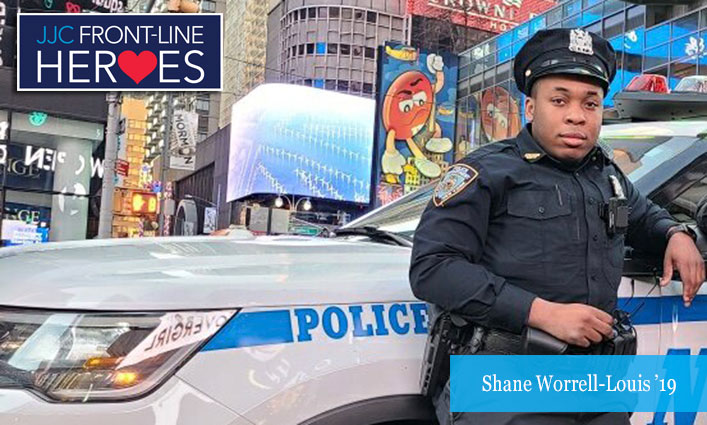
New York City is at the epicenter of the Covid-19 health crisis, and as a New York City-based College that educates students committed to public service, our alumni, students, faculty, and staff are working on the front lines to keep our communities safe. Our “Front-Line Heroes” article series serves as a testament to the valiant efforts of our first responders and essential workers. As a community we thank them for their service, dedication, and personal sacrifice.
Shane Worrell-Louis ’19, a New York City Police Department (NYPD) Officer from Brooklyn, New York, is carefully taking his response to the Covid-19 health crisis day by day. What’s grounding his approach is the education he received at John Jay and the unwavering encouragement he continues to receive from the Accelerate, Complete, Engage (ACE) Program. “John Jay and the support of the ACE program has played a large role in helping me handle the crisis,” says Worrell-Louis, who regularly connects with his ACE cohort members, the ACE faculty members, and ACE Director DeLandra Hunter. “A lot of my classes touched on emergency management, and the education I received has helped me make informed decisions based on prior events in history.”
“John Jay and the support of the ACE program has played a large role in helping me handle the crisis.” —Shane Worrell-Louis
Worrell-Louis started to understand the full impact of the virus when he saw massive overcrowding in the hospitals. Then his days on patrol started to become vastly different as more and more New Yorkers started following social distancing protocols and stayed at home. To better inform front-line workers on how to handle the pandemic, his department and other agencies started to release information on how officers could better protect themselves and the public. “Now, a typical day for me is making sure that businesses that are open follow the guidelines we’ve received, and businesses that are closed stay secure,” says Worrell-Louis. “I also provide wellness checks and engage with the public to ensure that everyone is safe during this tough time. I try to both enforce and promote social distancing.”
“A moment that will always stay with me is when I observed a young adolescent come out of a Wendy’s and donate his meal to a homeless person.” —Shane Worrell-Louis
As Worrell-Louis patrols the streets of New York City, he hopes that the community he serves understands that first responders are here for their protection and safety. “Being on the front lines of this pandemic is hard, but the acts of kindness that I have observed from everyday New Yorkers reaffirms that this is the best city in the world,” he says enthusiastically. “There are hard moments—like observing people in crisis or people who are battling health problems—but on the other hand, I see people donating what they can and coming together to provide aid.” A difficult inequity for Worrell-Louis to witness is the homeless population having nowhere to turn and nowhere to feel protected from the virus. When tragedy hits a nation, it’s always the poorest and most vulnerable among us that seems to take the hardest hit. “A moment that will always stay with me is when I observed a young adolescent come out of a Wendy’s and donate his meal to a homeless person. That’s what being a New Yorker is all about, getting the job done and helping others in need,” says Worrell-Louis.
“During these difficult times, we need to remember that unity is everything.” —Shane Worrell-Louis
Even in the midst of the pandemic—while his family worries about his safety and he worries about bringing the virus home to his loved ones—Worrell-Louis has come to some conclusions about preventative measures that should be considered in the future. “It’s very clear to me that we need to build better infrastructure and provide emergency personnel with the equipment they need to perform their jobs,” says Worrell-Louis. “Hospitals definitely need to upgrade their facilities. We should also continue to provide incentives to get more staff into the emergency management fields. Above all, during these difficult times, we need to remember that unity is everything. We are always stronger together.”



